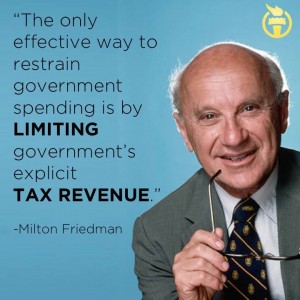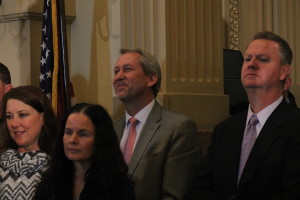In Colorado, School Funding Lags Despite A Booming Economy
Audio: CPR’s Jenny Brundin Reports On School Funding

Douglas Bruce, a driving force behind the Taxpayer’s Bill Of Rights, celebrates the amendment’s passing in November 1992. Critics say it now limits how much money is spent on education in Colorado.
(Courtesy Denver Public Library, Rocky Mountain News archives / Jay Koelzer)
This story is part of the NPR reporting project “School Money,” a nationwide collaboration between NPR’s Ed Team and 20 member station reporters exploring how states pay for their public schools and why many are failing to meet the needs of their most vulnerable students. Colorado’s economy is hot. The unemployment rate is 3 percent. And shiny new skyscrapers are rising all over Denver as revelers pour fistfuls of cash into downtown bars and restaurants.
But no one invited Colorado’s public schools to the party.
“They have outdated technology, larger class sizes. They’ve lost the opportunity to offer certain programs. They can’t retain teachers. They can’t attract teachers,” says Tracie Rainey with the Colorado School Finance Project, a nonprofit research group. “They’ve had fewer school days, furlough days, all sorts of maintenance issues.”
The list goes on. Many educators and parents had hoped that, as Colorado’s economy roared back from the Great Recession, the nearly $5 billion that lawmakers had cut from the state’s public schools would come back with it.
They were wrong.
“I was told that an improved economy would mean cuts would continue,” says Shannon Bird. The concerned mother of two school-age children lives north of Denver and has made several trips to the state Capitol to lobby for more funding. “Lawmakers told me their hands are tied.”
How is it that the nation’s 14th richest state ranks 42nd in how much it spends per student? Especially in a year that taxpayers can expect rebate checks from the state totaling $156 million?
Most Restrictive In The Country
The simple answer is, that’s what voters wanted. In 1992, they amended the state’s constitution with something called the Taxpayer’s Bill of Rights, or TABOR.






 Denver Mayor Michael Hancock speaks at a rally in support of Amendment 66 in 2013. What began as Initiative 22 was on the November 2013 ballot and would have increased the state’s income tax to raise revenue for public school spending by nearly 17%. The amendment failed at the ballot box. This year, Great Education Colorado is seeking a different path to more dollars for K-12 education by freeing public education spending from TABOR limits altogether.
Denver Mayor Michael Hancock speaks at a rally in support of Amendment 66 in 2013. What began as Initiative 22 was on the November 2013 ballot and would have increased the state’s income tax to raise revenue for public school spending by nearly 17%. The amendment failed at the ballot box. This year, Great Education Colorado is seeking a different path to more dollars for K-12 education by freeing public education spending from TABOR limits altogether.